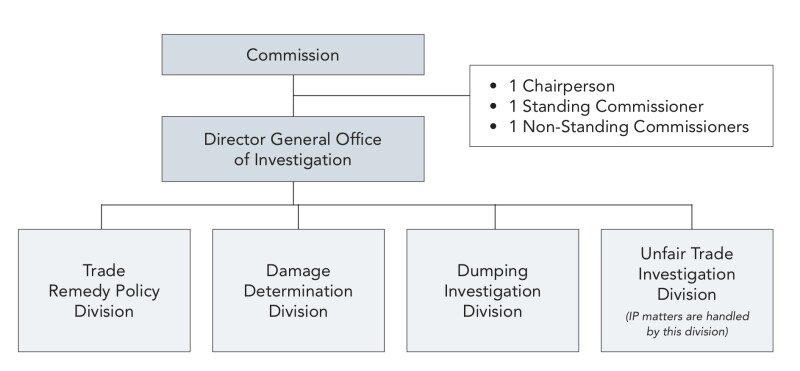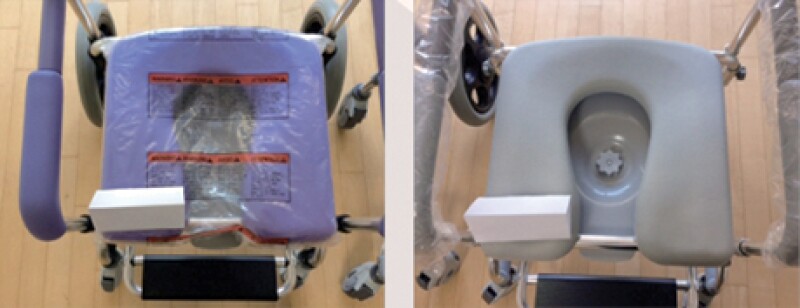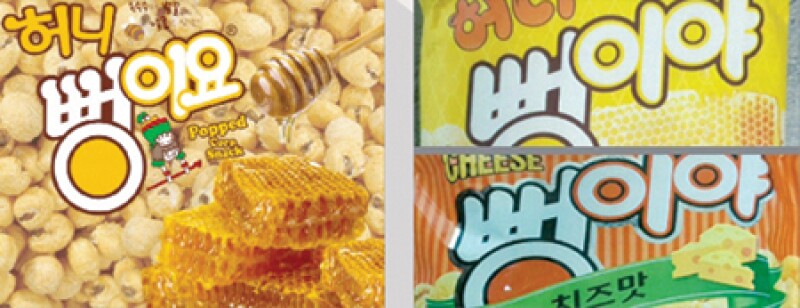Overall structure of the KTC
The Korea Trade Commission (KTC) is a quasi-judicial agency in the Ministry of Trade, Industry and Energy, established under the Act on the Investigation of Unfair International Trade Practices and Remedy against Injury to Industry (Unfair Trade Investigation Act: UTIA) for the purpose of protecting domestic industries from unfair international trade practices, such as dumping, subsidised importation and the infringement of IP rights.
The KTC is composed of one chairperson and eight commissioners, and is supported in its administrative work by the Office of Trade Investigation, which consists of four divisions: Trade Remedy Policy Division, Damage Determination Division, Dumping Investigation Division and Unfair Trade Investigation Division.
Among the four, the Unfair Trade Investigation Division handles unfair trade activities resulting from IP infringement. The functions of the Unfair Trade Investigation Division are (i) to investigate unfair international trade practices, such as the infringement of IP rights, violation of rules of origin and other practices liable to disrupt good order in international trades; and (ii) to investigate the impact of international trades on the competitiveness of domestic industries.
Trade remedy measures
Trade remedy (TR) measures are means for protecting domestic industries under the WTO agreements, the UTIA and the Customs Act. In cases where domestic industries are suffering or are likely to suffer serious injuries as a result of unfair international trade practices, the injured parties may file a petition with the KTC seeking (i) levy of anti-dumping duties; (ii) imposition of countervailing duties; (iii) implementation of safeguard measures; or (iv) investigation of unfair international trade practices.
According to the statistics on TR measures, there have been 598 petitions (180 for anti-dumping duties, 34 for safeguard measures and 384 for unfair international trade practice investigations) filed for TR measures through May 2021 and the KTC decided to take TR measures for 294 petitions (133 for anti-dumping duties, 22 for safeguard measures and 139 for unfair international trade practice investigations).
Figure 1: Organisation of the KTC

Investigation of unfair international trade practice
Among the above TR measures, the fourth type of TR measure, i.e. investigation of unfair international trade practices, is used against the exporting or importing of IP infringing goods, as explained in detail below.
Types of unfair international trade practices
Unfair international trade practices are defined under Article 4(1) of UTIA as follows:
i) Infringement of IP rights by importing goods violating IP rights into Korea, selling such imported goods domestically, exporting goods violating IP rights, or manufacturing such goods domestically for export;
ii) False or misleading markings of origin by exporting or importing goods whose marks of origin are false, misleading, damaged or modified, or goods subject to origin markings but whose origins are not marked;
iii) False or exaggerated markings of quality of exported/imported goods; and
iv) Disrupting export/import by exporting or importing goods significantly different from those detailed in the contract to cause disputes.
Figure 2: Investigation procedure

Procedure for unfair international trade practice investigation
Anyone may file a petition for the investigation of unfair international trade practices with the KTC within two years from the occurrence of the act of unfair international trade. The KTC may also undertake an ex officio investigation, if necessary, when there is a reasonable suspicion of unfair international trade practices.
The petitioner should show that (i) the petitioner’s IP rights remain valid and in force; (ii) the petitioner’s IP rights have been infringed by the respondent; (iii) the respondent has conducted activities corresponding to the unfair trade practices, e.g. exporting, importing, etc.; and (iv) the activities were conducted within two years prior to the filing of the petition.
|
|
“Any party who violates an order for temporary relief or corrective measures shall be punished by imprisonment of up to three years or a fine not to exceed 30 million won.” |
|
|
Circumstantial evidence may be sufficient for initiating the investigation by the KTC, since more concrete evidence on the infringing activities can be later supplemented by the request of the KTC to the Korea Customs Service (KCS). The KTC shall decide whether to commence the investigation within 20 days from the date of filing (Article 5 of the UTIA).
In case there appears to be irrevocable harm or a likelihood of irrevocable harm caused by unfair trade activities, the KITC may issue temporary relief in the form of cease-and-desist orders, including injunctions against export, manufacturing, import, sales of imported products and seizure/exclusion orders against the products, parts/raw materials and/or manufacturing facilities (Article 7 of the UTIA). In this connection, in order to discourage frivolous requests for temporary relief, the petitioner is required to post a bond equivalent to the value of the expected sales amount of the infringing goods for a period of six months upon the grant of temporary relief (Article 8 of the UTIA).
The KTC shall promptly complete the investigation within six months from the commencement decision, but the investigation period may be extended twice for up to four months, (i) where a lawsuit or patent trial associated with the unfair international trade act under investigation is pending; (ii) where the petitioner or the respondent requests an extension by presenting justifiable ground(s); and (iii) in other cases deemed necessary to extend the period for unavoidable reason(s) (Article 9 of the UTIA). Therefore, it normally takes six to 10 months from commencement to reach a final decision.
Corrective measures and penalties
If there is a finding of unfair international trade practice, the KTC may issue an order for corrective measures and/or impose penalty surcharges. The corrective measures include (i) cease-and-desist orders to stop activities of unfair international trade practice; (ii) orders to prohibit entry into the market and destroy goods in stock; (iii) orders to publish an apology advertisement; (iv) orders to publicise the KTC’s corrective orders; and (v) other necessary measures to correct unfair international trade practices (Article 10 of the UTIA).
Any party who violates an order for temporary relief or corrective measures shall be punished by imprisonment of up to three years or a fine not to exceed 30 million won (approximately $26,115) (Article 40(2) of the UTIA).
The KTC may impose upon the relevant actors (i) a penalty surcharge not exceeding an amount equivalent to 30% of the annual transaction amount averaged for the recent three years when the unfair international trade practices involve activities of infringement of IP rights, false or exaggerated markings of quality and disrupting export/import; and (ii) a penalty surcharge not to exceed 300 million won when the unfair international trade practices involve false or misleading markings of origin (Article 11 of the UTIA).
Any party who objects to the KTC’s disposition may raise an objection to the KTC within 14 days from the notification of such disposition in case of temporary relief, or within 30 days from the notification of such disposition in case of corrective measures and penalty surcharge.
The KTC shall render a decision within 60 days from the opposition, and this period may be extended for up to 30 days if the decision cannot be made due to unavoidable circumstances, such as submissions of new evidence during the investigation. The party who raises an objection may file an administrative appeal before the administrative court, separately from the objection (Article 14 of the UTIC). However, the KTC decision is enforceable unless the court hearing the administrative action renders an order suspending the enforcement of the KTC decision until the outcome of its decision in the pending appeal case.
Advantages of the KTC proceedings for IP infringement
The KTC proceedings are often quick, simple and cost-effective since the petitioner can obtain the decision within about 10 months from the date of the commencement of the investigation. In particular, the KTC proceedings can be useful to secure early relief against the trafficking of goods infringing IP rights across the border, although the rights holder may eventually have to initiate court proceedings to recover damages.
The KTC’s corrective measure of a cease-and-desist order will have the same effect as a preliminary injunction; and, if it is not lifted during the appeal process, will have the same effect as a permanent injunction.
Once the KTC finds infringement of IP rights with respect to the accused goods, an order of the KTC to prohibit entry into the market of the infringing goods can be effectuated to other parties dealing in the same goods, regardless of the name of the provider, importer, or seller thereof, through the simple procedure of having the KTC acknowledge that the goods dealt in by these entities are identical to the infringing goods.
In practice, the KTC requests the KCS to provide information on the imported amount of the accused goods during its investigation. Therefore, such information is useful in determining the amount of monetary damages in a future main action.
The customers of the accused product, who wish to receive a stable supply of such goods, will be definitely affected by the prompt and strong effect of the KTC decision.
Example cases
Here are some example cases involving IP rights infringement for which an investigation of unfair international trade practice was carried out and an order for corrective measures was issued by the KTC.
Bath stool case: patent and design infringement

The petitioner, the owner of a patent and a design right on a bath stool, filed a petition for an unfair international trade practice investigation with regard to the respondent’s activities of importing, from Taiwan, bath stools allegedly infringing its patent and design rights.
The KTC decided to initiate the investigation and carried out a review of relevant documents/evidence, as well as on-site inspections for about four months.
The KTC found that the respondent’s activities constituted the unfair international trade practice of infringing the petitioner’s patent and design rights, and issued an order to cease the export/import of the accused goods, destroy the accused goods, and publicise the KTC’s disposition of corrective measures (January 30 2018).
Gel pen case: copyright infringement

The petitioner is a copyright holder for ‘fruits rabbit’ characters, which are rabbit figures featured with fruit-shaped ears, and the respondents imported, from China, gel pens characterised by rabbit figures with fruit-shaped ears.
The KTC conducted an investigation for six months and rendered a decision that the respondents’ importation of gel pens constituted an unfair international trade practice by infringing the petitioner’s copyright.
The KTC ordered the respondents to cease export/import of the accused goods and publicise the KTC’s disposition of corrective measures, and also imposed penalty surcharges (December 11 2019).
Snack case: trademark infringement

The petitioner owns a registered trademark for a snack, formed by a combination of two words written in a unique font type. The respondents manufactured a similar snack in Korea and exported same to Vietnam, under similar trademarks.
The KTC carried out an investigation for six months and decided that the respondent’s trademarks infringed upon the petitioner’s registered trademark, and the respondents’ activities of manufacturing and exporting the snack with the infringing marks constituted unfair international trade practice.
The KTC ordered the respondents to cease exporting the goods as well as manufacturing the goods for the purpose of exportation, destroy the goods in stock, and publicise the KTC’s disposition of corrective measures, and also imposed penalty surcharges (February 6 2020).
Click here to read all the chapters from Asia-Pacific IP Focus 2021

Kye Young Lee
Patent attorney
FirstLaw PC
T: +82 2 589 0010
Kye Young Lee is a patent attorney and partner at FirstLaw PC. Her practice covers a variety of IP matters ranging from prosecution, litigation to due diligence.
Kye Young has extensive patent prosecution experience in electrical/software fields such as computer software, artificial intelligence, big data, wireless communication, electronic transaction, and semiconductors. She has been recently appointed as a commissioner of the Korea Trade Commission and expects to be actively involved in investigation of unfair trade practices associated with IP infringement for the three-year term.
Kye Young received her bachelor’s degree in computer science and statistics, and then completed a master’s degree in computer science, from Seoul National University. She also completed her LLM degree at the University of Southern California, Gould School of Law. She has been admitted to the Korean Patent Bar and the California State Bar.

Hyoun Ja Park
Patent attorney
FirstLaw PC
T: +82 2 589 0010
Hyoun Ja Park is a partner and patent attorney at FirstLaw PC, which she joined in 1997. Her areas of technical expertise covers various aspects of electrical engineering including wireless communication, artificial intelligence, robotics, e-commerce, computer software, and semiconductors.
Being admitted to the Korean Patent Bar and the Ohio State Bar, Hyoun Ja has been actively involved not only in many important prosecution cases but also high-profile trial/litigation cases on behalf of domestic and multinational corporations. Her practice also encompasses IP due diligence, evaluation, licensing, portfolio development and management.
Hyoun Ja received her bachelor’s and master’s degrees in control and instrumentation engineering from Seoul National University. She obtained her JD degree at the Ohio State University, Moritz College of Law.













